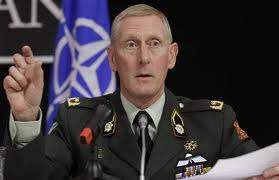NATO carried out fresh air raids on Tripoli Saturday as Moamer Gaddafi’s government planned to withdraw from the besieged third city of Misrata and leave local tribes to fight off insurgents.
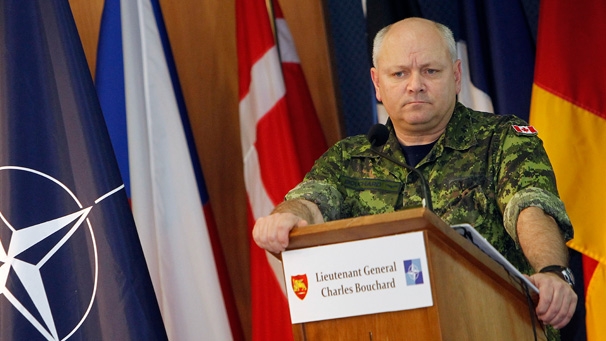 NATO carried out fresh air raids on Tripoli Saturday as Moamer Gaddafi's government planned to withdraw from the besieged third city of Misrata and leave local tribes to fight off insurgents.
NATO carried out fresh air raids on Tripoli Saturday as Moamer Gaddafi's government planned to withdraw from the besieged third city of Misrata and leave local tribes to fight off insurgents.
Senior US Senator John McCain urged the Western coalition on Friday to launch intensified air strikes against Libyan troops and recognize the rebels' council as he became the highest-ranking US politician to visit the rebel-held east since the popular uprising began in mid-February.
Rebels bogged down in their bid to oust Gaddafi on Friday hailed a US decision to deploy armed drones over Libya.
AFP journalists reported hearing several blasts early Saturday after many warplanes flew over the Libyan capital.
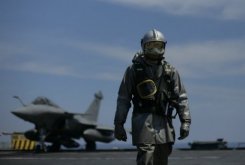 Anti-aircraft fire rang out as ambulance sirens wailed. Al-Libya television said Tripoli was "now the target of raids by the barbaric crusader colonialist aggressor," a term used for Western forces.
Anti-aircraft fire rang out as ambulance sirens wailed. Al-Libya television said Tripoli was "now the target of raids by the barbaric crusader colonialist aggressor," a term used for Western forces.
The official JANA news agency reported that two people died in NATO air raids late Friday on the Zenten region southwest of Tripoli where stepped up fighting has taken place with rebels who hold several towns. NATO warplanes had over flown Libyan leader Moamer Gaddafi's stronghold throughout the day.
Libyan Deputy Foreign Minister Khaled Kaim said armed tribesmen would be dispatched to Misrata, while the army would be phased out, to deal with the rebellion "using force or negotiation.'
Kaim said US President Barack Obama's administration had decided to send drones to Libya "to assassinate the people," accusing Washington of "new crimes against humanity" after those he said had been committed in Iraq and Afghanistan.
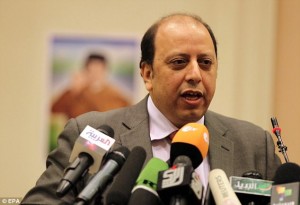 Libyan Deputy Foreign Minister Khaled Kaim |
The US military's top officer, meanwhile, said allied air strikes had destroyed 30 to 40 percent of Gaddafi's forces and noted the conflict was progressing into a stalemate.
Rebels, who on Thursday overran a post on the Tunisian border in their first advance in weeks against Gaddafi's forces, have complained that civilians are being killed in places like Misrata, where entire streets have been pulverized by gunfire, shelling and cluster bombs.
"Our houses are being hit by bombs and rockets," said 45-year-old Ibrahim Issa Abu Hajjar, who fled the city with hundreds of civilians aboard a Turkish ferry to Benghazi.
Simon Brooks of the International Committee of the Red Cross issued a stark warning that the humanitarian situation could "rapidly deteriorate further and the lack of basic services such as water, electricity, food and medical care could turn critical."
The UN refugee agency said some 15,000 people had fled fighting in western Libya into Tunisia in the past two weeks and a much larger exodus was feared.
However, French President Nicolas Sarkozy signaled his agreement "in principle" to follow in McCain's footsteps and visit Benghazi.
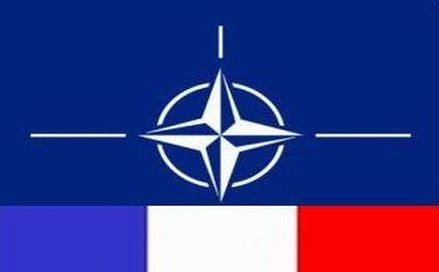 France, Italy and Britain have said they would send military personnel to eastern Libya, but only to advise the rebels on technical, logistical and organizational matters and not to engage in combat.
France, Italy and Britain have said they would send military personnel to eastern Libya, but only to advise the rebels on technical, logistical and organizational matters and not to engage in combat.
Government troops have held back rebels for more than three weeks in eastern Libya and suffered heavy losses in Misrata.
Rebel leaders there have pleaded for foreign help, saying the air strikes are not enough to dislodge Gaddafi troops hiding in civilian areas and fighting street by street.
The French foreign ministry said the European Union was planning for a possible military intervention to bring aid to Misrata despite UN reservations.
"Faced with the worsening humanitarian situation, in particular in Misrata, the multinational general staff in Rome is continuing to plan for a military operation to support humanitarian aid," spokeswoman Christine Fages said.
"The European Union is ready to respond to any UN request."
Gambia, meanwhile, said it was recognizing the Libyan Transitional National Council as the only legitimate body representing Libyan interests, and expelling Tripoli's diplomats.
It became the fourth country after France, Italy and Qatar to recognize the TNC.
